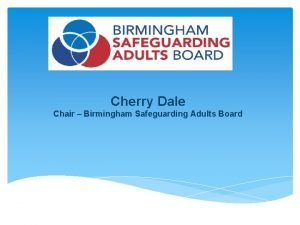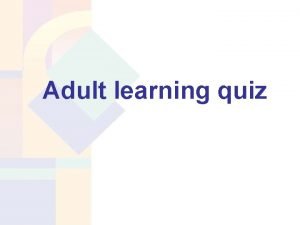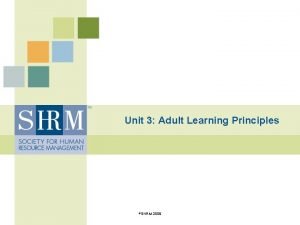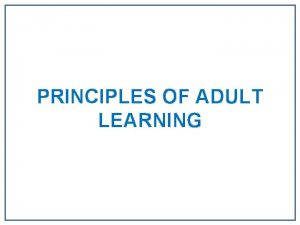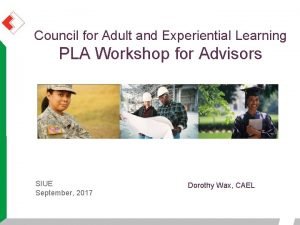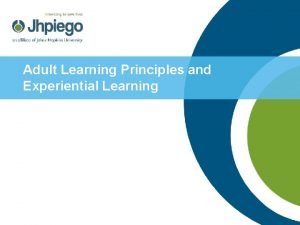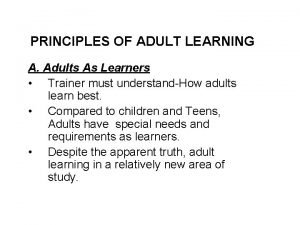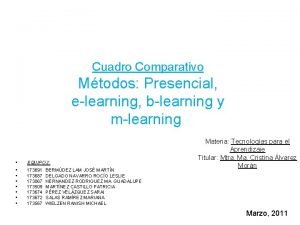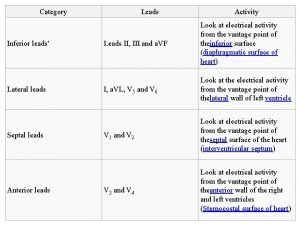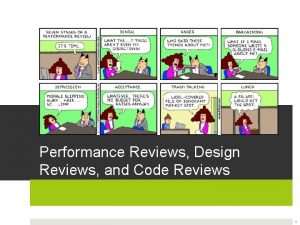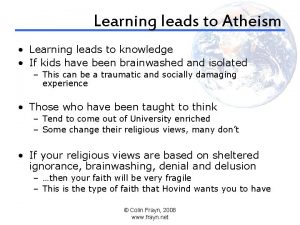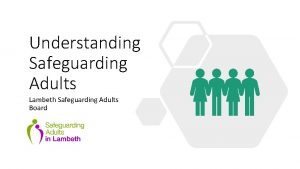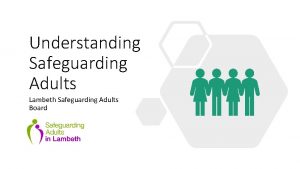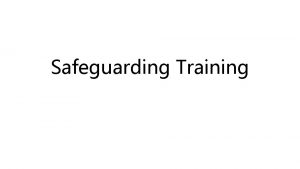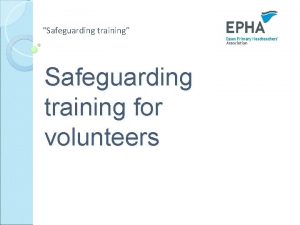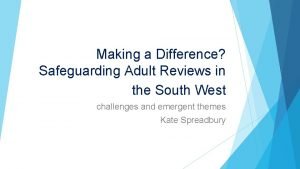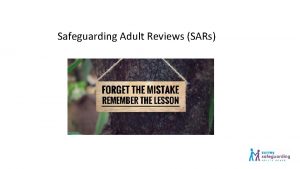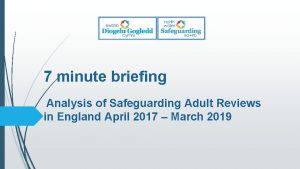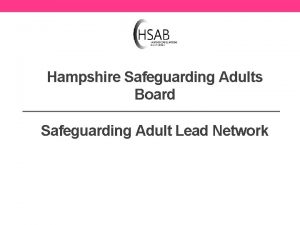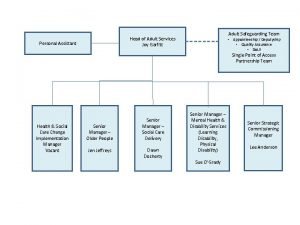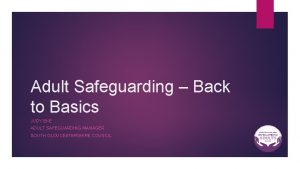SAFEGUARDING ADULT REVIEWS LEARNING WORKSHOP Leads for Safeguarding


















- Slides: 18

SAFEGUARDING ADULT REVIEWS LEARNING WORKSHOP Leads for Safeguarding Adults: Kathy Kelly – Clinical Commissioning Group Jo Wilkins – Reading Borough Council

Welcome! • What to expect: Aims • Ground rules/house keeping. • Learning Environment… This requires participation. So please ask questions and get involved. We want to know if this session makes a difference and if not, what might.

Safeguarding Adult Reviews • What are they? • Why do they happen? • Who might be involved?

Local SAR Reviews • In 2016 the SAB commissioned two external reviews. • Mr I • Mrs H You have been given the case scenarios on your tables.

…IT’S A WORK SHOP SO LET’S GET TO WORK……. Use the exercise sheets on your tables. Work through the sheet for Mrs H or Mr I. Please do not read ahead. 30 – 40 Mins

FEEDBACK

What we learned Mr I Finding 1 Management systems Supervision processes are not supporting practitioners to work with the complexity of capacity decisions in relation to adults with addictive behaviours, with the result that assessments of capacity are made but practitioners act as though capacity is lacking. Finding 2 Management systems The tendency to assume that everyone knows about and understands Management policy, procedure and guidance, but not quality assuring how well they actually do, is resulting instead in a culture of informal agreements, misunderstandings and tensions. Finding 3 Innate Human Bias There is a confusion about the meaning of ‘duty of care’ that is generating risk averse practice and preventing the voice of the service user being heard

What we learned Mrs H Finding 1 – Assumption of a lack of capacity due to having dementia. Finding 2 – Responsibilities under The Mental Capacity Act not fully understood or applied in practice. Finding 3 – Professional curiosity hampered by shortterm intervention model. Finding 4 – Lack of understanding of risk due to poor communication between professionals. Finding 5 – Professional analysis/discussion hampered by automated processes within Social Care.

PROFESSIONALS EXPERIENCE OF THE PROCESS LEARNING 10 mins feedback and questions for the workers involved

What has been changed • Some examples from Mr I and Mrs H work from the effectiveness Sub Group: • Dementia audit across BHFT, RBFH, RBC and WBC • RAMP (Previously REP – MDT Panel for colleagues to discuss existing high or escalating risk). Based upon: • http: //www. sabberkshirewest. co. uk/media/1086/west-of-berkshire -at-risk-pathway-april-2014. pdf • Supervision policies being reviewed. • MCA priority Training - link to the MCA week in October. • Pressure ulcer campaign pathway : www. sabberkshirewest. co. uk/media/1272/appendix-5 -pressurecare-pathways-revised-published-may-2017 -2 • SAB briefings

React to Red Campaign

Additional learning MR X SAB Web Site • • • Mr X had some degree of LD and lived a chaotic lifestyle; substance misuse, various police warnings, serious suicide attempt which resulted in injury to his brain. He was involved at times with CMHT. He had complex relationships, interdependency and possible DA coercion between siblings. Combined agency chronology indicated he had received adequate services and practice followed at the point the safeguarding referral was made but felt they were common themes in the case from previous and other reviews. Cross Learning • • • No formal capacity assessments. Housing Team need to improve knowledge and skills about capacity and improve links to SAB. MCA week learning event w/c 16 th Oct. Advocacy - issue for police; appropriate adult pathways raised at SAB. Risk management of complex case processes: pathways action for multi agency risk pathway sent in newsletter : RAMP for Reading More awareness on suicide prevention for the SAB booked for September 2017 DA and Coercive/Control learning events advertised in RBC drop in sessions at the Civic.

DOMESTIC ABUSE Domestic violence and abuse The cross-government definition of domestic violence and abuse is: any incident or pattern of incidents of controlling, coercive, threatening behaviour, violence or abuse between those aged 16 or over who are, or have been, intimate partners or family members regardless of gender or sexuality. The abuse can encompass, but is not limited to: • • • psychological physical sexual financial emotional

Controlling behaviour is a range of acts designed to make a person subordinate and/or dependent by isolating them from sources of support, exploiting their resources and capacities for personal gain, depriving them of the means needed for independence, resistance and escape and regulating their everyday behaviour. Mr X - The questions raised were: what was this brotherly relationship? Was it support or control? Coercive behaviour is an act or a pattern of acts of assault, threats, humiliation and intimidation or other abuse that is used to harm, punish, or frighten their victim. This is not a legal definition. Was there intimidation/fear ?

Coercive Control PHYSICAL / SEXUAL VIOLANCE Isolation Intimidation& Stalking & Degradation Control

CONTROLLING BEHAVIOURS Serious Crime Act - Section 76 • Access to/use of money, phone, Facebook or other social media. • Enforced Diet. • Prohibited contact with friends, family and health services. • Monitoring and/or constraining movements (‘never letting him/her go out alone’). • Continual belittlement. • Regulating what she/he wore, sleep, hairstyle & makeup. • Harming or threatening children. • Continual jealous accusations.

The Purpose of Today • What have you learnt/taken away from today? • Reflection • Please complete the ‘What will you do’ sheet. • We will be calling people next month to see if and how you’ve been able to put this into practice. Please complete the learning sheet with your details

THANK YOU
 Hyperacute t waves
Hyperacute t waves Birmingham safeguarding board
Birmingham safeguarding board Adult learning pyramid
Adult learning pyramid 7 principles of adult learning
7 principles of adult learning Adult learning objectives
Adult learning objectives Council for adult and experiential learning
Council for adult and experiential learning Brookfield adult learning
Brookfield adult learning Adult learning principles
Adult learning principles Adult learning styles
Adult learning styles For adult
For adult Cuadro comparativo e-learning b-learning m-learning
Cuadro comparativo e-learning b-learning m-learning Formuö
Formuö Typiska novell drag
Typiska novell drag Tack för att ni lyssnade bild
Tack för att ni lyssnade bild Returpilarna
Returpilarna Varför kallas perioden 1918-1939 för mellankrigstiden?
Varför kallas perioden 1918-1939 för mellankrigstiden? En lathund för arbete med kontinuitetshantering
En lathund för arbete med kontinuitetshantering Personalliggare bygg undantag
Personalliggare bygg undantag Personlig tidbok
Personlig tidbok

